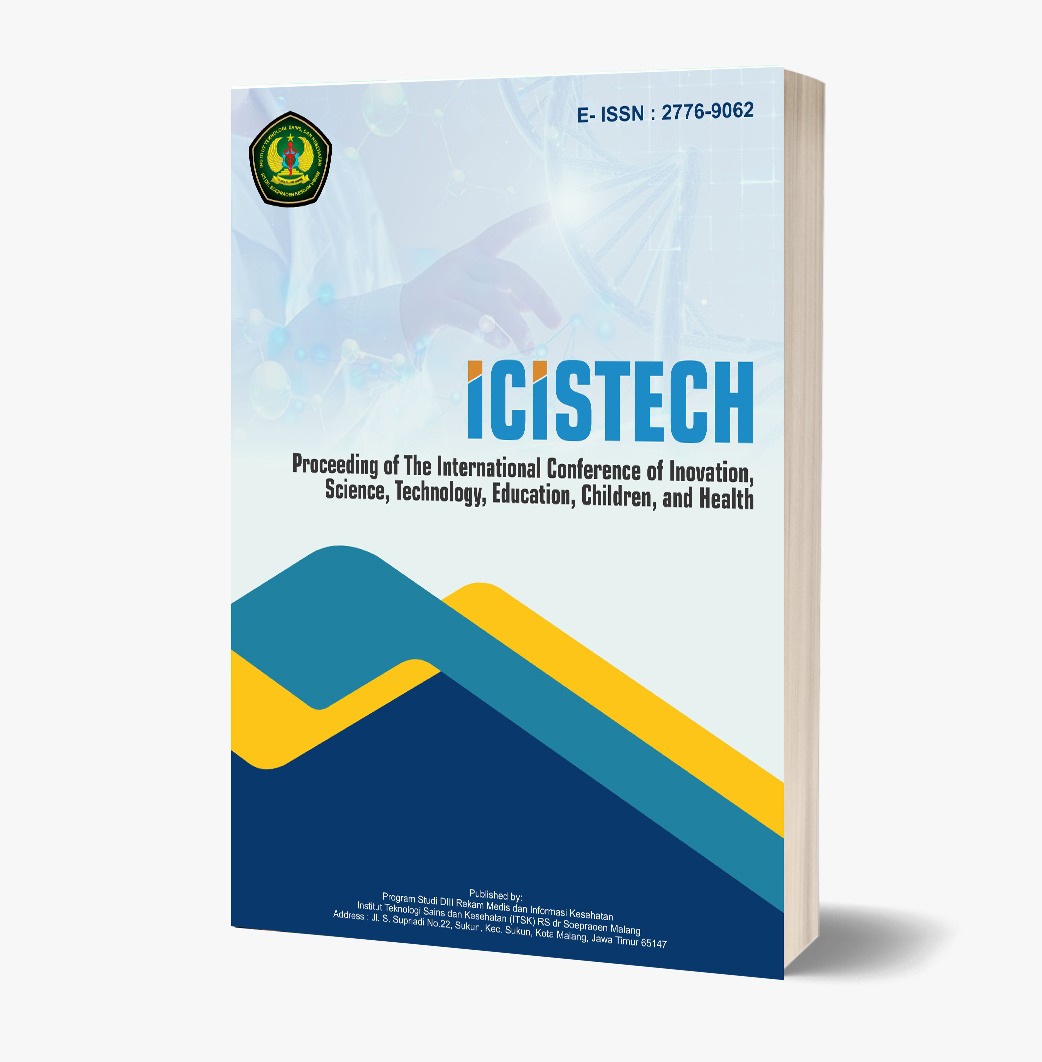Perspektif Qur'anic Perspectives on Digital Health Ethics and Artificial Intelligence
DOI:
https://doi.org/10.62951/icistech.v5i1.275Keywords:
Perspective, Quran, Digital Ethics, Artificial IntelligenceAbstract
The digital revolution in global health presents great opportunities and challenges through the integration of artificial intelligence (AI), big data and telemedicine. However, the absence of a transcendent ethical foundation in the development of medical technology risks undermining human values and justice. This study aims to critically examine the direction of digital health development by integrating the ethical and spiritual values of the Qur'an. The method used is a critical qualitative approach based on library research, with normative analysis of verses related to health principles, information ethics, and maqāṣid al-syarī'ah. The results of the study show that in QS. Al-Isrā': 70 emphasizes human dignity as the basis for medical data protection; likewise in QS. Al-Syu'arā': 80 emphasizes that healing is divine and should not be separated from spiritual values; while in QS. Al-Baqarah: 286 provides guidance on the limits of responsibility and human capabilities in the utilization of technology. The critical discussion underlines the importance of building Qur'anic-based digital ethics that emphasize justice ('adālah), trustworthiness, and compassion (raḥmah) in designing equitable and inclusive artificial intelligence (AI) systems and remote health services. It is hoped that this study will provide recommendations for the development of Qur'anic Digital Ethics as a future normative framework for global digital health innovation.
References
[1] "Global digital health monitor state of digital health 2024 brief," no. March, pp. 1-11, 2025.
[2] Ahmadin, *Sosiologi ruang virtual*. Bandung: Widina Bakti Persada, 2023.
[3] al-F. I. I. Kasîr, *Tafsîr Al-Qur'ân al-'Azîm*, vol. 3. Riyad: Dar al Salam, 1998, p. 53.
[4] Biorxiv n2, "Cultural synthesis in Islamic pedagogy: Nurturing identity through the integration of local heritage in educational practices," *Int. J. Teach. Learn.*, vol. 1, no. 1, pp. 4-6, 2024. [Online]. Available: https://injotel.org/index.php/12/article/view/68
[5] E. T. Warner et al., "The study on stress, spirituality, and health (SSSH): Psychometric evaluation and initial validation of the SSSH baseline spirituality survey," *Religions*, vol. 12, no. 3, pp. 1-17, 2021, doi: 10.3390/rel12030150.
[6] G. Sukiya et al., "Analysis of the Maudhu'i Tafsir: Mahabbah's orientation in the light of Al-Qur'an," *Ushuluddin*, vol. 30, no. 1, pp. 186-197, 2022, doi: 10.24014/Jush.v30i2.
[7] Hakim, F. M. Sholihah, and N. A. Anifa, "Konsep ikhtiar dalam berobat sesuai ajaran Islam," *J. Relig. J. Agama, Sos. dan Budaya*, vol. 1, no. 4, pp. 914-924, 2023.
[8] Halihasimi, S. Kholil, and A. A. Azhar, "Efektivitas etika komunikasi digital Islam dalam pendidikan Islam di lingkungan Kementerian Agama Aceh Tengah," *Edukasi Islam. J. Pendidik. Islam*, vol. 12, no. November, pp. 5255-5266, 2023, doi: 10.30868/ei.v12i04.5255.
[9] Information, "Master's thesis topic proposal," no. March, pp. 0-90, 2013, doi: 10.13140/RG.2.2.17990.18245.
[10] J. M. Gray and G. P. S. Tejay, "Introducing virtue ethics concepts into the decision processes of information systems trusted workers: A Delphi study," *Int. J. Inf. Comput. Secur.*, vol. 12, no. 1, pp. 1-19, 2020, doi: 10.1504/IJICS.2020.103997.
[11] J. Makruf, "Wajah Islam Asia Tenggara". [Online]. Available: www.dipertais.net/artikel/jamhari01.asp
[12] M. A. Susanto, "Islam dan teknologi: Tantangan etika dan adaptasi dalam era digital," vol. 1, no. 2, pp. 95-102, 2024.
[13] M. Alimuddin and Yuzrizal, "Jurnal Pendidikan dan Pemikiran Islam," *J. Pendidik. dan Pemikir. Islam*, vol. 7, no. 2, pp. 113-122, 2020. [Online]. Available: http://conference.kuis.edu.my/pasak2017/images/prosiding/nilaisejagat/10-MAAD-AHMAD.pdf
[14] M. F. Abdillah, "Revolusi digital kesehatan: Meningkatkan layanan dengan kecerdasan buatan," *J. Ilm. Indones.*, vol. 9, no. 10, 2024.
[15] M. H. Ridla and A. Fawaid, "Kisah Karun dalam Al-Qur'an: Perspektif Maqāṣid Al-Qur'an Yūsuf Al-Qarḍāwĭ dalam Kayfa Nata'Āmal Ma'a Al-Qur'Ān Al-'Aẓĭm," *Revel. J. Ilmu al-Qur`an dan Tafsir*, vol. 3, no. 1, pp. 83-103, 2022, doi: 10.19105/revelatia.v3i1.6320.
[16] M. H. Rosidi, A. W. B. Mokhtar, and M. N. B. A. Majid, "The role of Maqasid Al-Shari'ah as a fundamental ethics in social media use," *Int. J. Acad. Res. Bus. Soc. Sci.*, vol. 12, no. 4, pp. 1285-1301, 2022, doi: 10.6007/ijarbss/v12-i4/13044.
[17] M. Quraish Shihab, *Wawasan al-Qur'an: Tafsir Maudhu'i atas pelbagai persoalan umat*, 13th ed. Bandung: Mizan Pustaka, 1996.
[18] M. R. Abdul et al., *Moderasi beragama: Akar teologi, nalar kebudayaan, dan kontestasi di ruang digital*. 2023. doi: 10.55981/brin.904.
[19] M. S. Ummah, "No 主観的健康感を中心とした在宅高齢者における 健康関連指標に関する共分散構造分析Title," *Sustainability*, vol. 11, no. 1, pp. 1-14, 2019. [Online]. Available: http://scioteca.caf.com/bitstream/handle/123456789/1091/RED2017-Eng-8ene.pdf
[20] M. Ulya and M. Yasir, "Mental health based on the Qur'an perspective," vol. 2, pp. 7-14, 2024.
[21] M. Ulya and N. Wijaya, "Multicultural contextualization based on the Quran in Islamic religious education learning," *Procceding suska Press*, vol. 1, no. 1, pp. 161-169, 2022. [Online]. Available: https://jom.uin-suska.ac.id/index.php/TSCS/article/view/ulya
[22] M. Ulya and T. Helmi, "Environmental ethics in multicultural education based on the Qur'an," pp. 15-16, 2024. [Online]. Available: https://jom.uin-suska.ac.id/index.php/TSCS/article/view/3610
[23] M. Ulya, "Miftah Ulya; Pendidikan pluralis ... 165," pp. 165-179.
[24] M. Ulya, *Internalisasi nilai-nilai Qurani bagi generasi milenial menuju masyarakat Indonesia emas*. Padang Pariaman: Lingkar Edukasi Indonesia, 2024. [Online]. Available: https://www.researchgate.net/profile/Lingkar-Edukasi-Indonesia/publication/385317972_Internaslisasi_Nilai-nilai_Qur'ani_bagi_Generasi_Milenial_Menuju_Masyarakat_Indonesia_Emas/links/6762815de9b25e24af60d090/Internaslisasi-Nilai-nilai-Qurani-bagi-Generasi-
[25] M. Ulya, vol. 32, no. 2, pp. 234-248, 2024, doi: 10.24014/Jush.v32i2.33042.
[26] P. Prawiroharjo, P. Pratama, and N. Librianty, "Layanan telemedis di Indonesia: Keniscayaan, risiko, dan batasan etika," *J. Etika Kedokt. Indones.*, vol. 3, no. 1, p. 1, 2019, doi: 10.26880/jeki.v3i1.27.
[27] P. Studi et al., "Kesenjangan regulasi dan praktik perlindungan konsumen pada layanan telemedicine di Indonesia," vol. 6, no. 4, pp. 1035-1041, 2025.
[28] R. Sparrow and J. Hatherley, "High hopes for 'deep medicine'? AI, economics, and the future of care," *Hastings Cent. Rep.*, vol. 50, no. 1, pp. 14-17, Jan. 2020, doi: 10.1002/hast.1079.
[29] Robeyns, *Wellbeing, freedom and social justice*. Open Book Publishers, 2018. [Online]. Available: https://books.openedition.org/obp/4826
[30] Rusyandi, "Kesehatan dalam perspektif hukum: Sebuah kajian sejarah dan pendekatan Maqasid Syariah," *Ekasakti*, vol. 5, no. 1, 2024.
[31] S. Primasatya, "Perlindungan terhadap perkembangan layanan kesehatan berbasis kecerdasan buatan (Artificial Intelligence) di Indonesia," *J. Glob. Huk.*, vol. 1, no. 1, pp. 78-93, 2024, doi: 10.25105/jgh.v1i1.19833.
[32] W. Dusuki and A. Abozaid, "A critical appraisal on the challenges of realizing Maqasid Al-Shariaah in Islamic banking and finance," *IIUM J. Econ. Manag.*, vol. 15, no. 2, pp. 999-1000, 2007, doi: 10.2307/1236148.
[33] W. Sasmita and F. N. Riswandi, "Studi komparasi pendidikan kewarganegaraan pada anak usia dini di negara Indonesia dengan negara Arab," *J. Pendidik. Anak Usia Dini*, vol. 3, no. 2, p. 2023, 2023. [Online]. Available: https://doi.org/10.33367/piaud.v3i2.4468
[34] W. Z. Khan et al., "Ethical aspects of internet of things from Islamic perspective," in *2017 9th IEEE-GCC Conf. Exhib.*, 2018, doi: 10.1109/IEEEGCC.2017.8448105.
Downloads
Published
How to Cite
Issue
Section
License
Copyright (c) 2025 Proceeding of The International Conference of Inovation, Science, Technology, Education, Children, and Health

This work is licensed under a Creative Commons Attribution-ShareAlike 4.0 International License.













